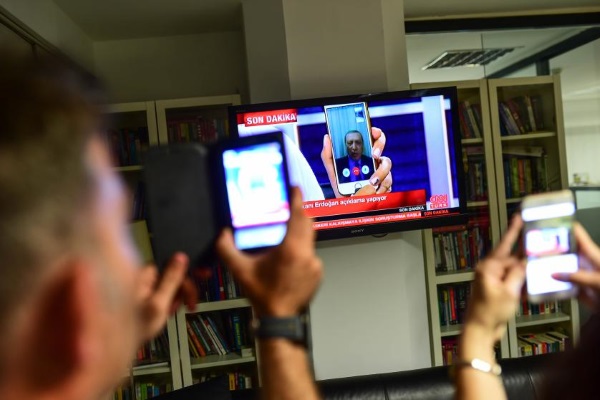
ISTANBUL, TURKEY - JULY 15: Turkish President Recep Tayyip Erdogan speaks on CnnTurk via facetime call on July 15, 2016 in Istanbul, Turkey. Istanbul's bridges across the Bosphorus, the strait separating the European and Asian sides of the city, have been closed to traffic. Reports have suggested that a group within Turkey's military have attempted to overthrow the government. Security forces have been called in as Turkey's Prime Minister Binali Yildirim denounced an 'illegal action' by a military 'group', with bridges closed in Istanbul and aircraft flying low over the capital of Ankara (Photo by Burak Kara/Getty Images)
By: Dorian Jones
Source: VOA News
ISTANBUL – Turkish officials said Saturday that 2,839 soldiers and officers who attempted a coup late Friday had been arrested, as the president accused an exiled cleric of organizing the plot.
Among the top military officers detained was the commander of the Third Army Corps, General Erdal Ozturk, based in Istanbul, who would face charges of treason.
A number of high-ranking military officials have fled to neighboring Greece by helicopter and have requested political asylum. According to local media reports, some of them are believed to be among the architects of the coup.
As many as 2,745 judges reportedly have been suspended for allegedly having links to the cleric, Fethullah Gulen. Turkish media also reported that 140 arrest warrants had been issued against members of Turkey’s Supreme Court.
Gulen, who lives in the U.S. state of Pennsylvania, has denied he was behind the plot. On Saturday, U.S. Secretary of State John Kerry said that Turkey had not made a formal extradition request for Gluen, but that the United States would consider complying with it if Turkey’s government presented solid evidence of wrongdoing.
Sources said the chief concern in Turkey at the moment was whether the detentions and purges would be confined to just followers of Gulen or would be expanded to opponents of the president.
Prime Minister Binali Yildrim addressed the nation Saturday afternoon, calling the night a “dark stain for the Turkish state.” Officials warned that those who backed the coup would not be easily forgiven.
There were varying reports of the number of people killed in clashes, but officials said it was at least 265.
On Saturday, the situation remained tense in Istanbul, Ankara and some other cities, with sporadic violence continuing. Turkish media reported intense clashes at a large military barracks outside Ankara, which was thought to be a stronghold of the coup plotters.
The U.S. Defense Department released a statement Saturday saying that the Turkish government had closed its airspace to military aircraft, and that as a result, air operations at Incirlik Air Base had been halted. The statement said U.S. officials were working with Turkey to resume the flights, and U.S. Central Command adjusted flight operations to minimize effects on the air campaign against Islamic State.
Western intelligence and military officials were closely monitoring developments in NATO member Turkey, a key U.S. ally in the war against Islamic State terrorists. Turkey is also a supporter of the moderate opposition looking to overthrow Syrian President Bashar al-Assad.
U.S. President Barack Obama and Kerry issued statements calling on all parties in Turkey to support the country’s democratically elected government.
Obama also underscored the shared challenges that will require continued Turkish cooperation, including joint efforts of the two countries against terrorism.
Nihad Awad, executive director of the Council on American-Islamic Relations told VOA the coup should be rejected and denounced.
“Any attempt to delegitimize and take over the government is an assault on the will of the Turkish people, because they elected that government through the ballot box and bullets should not be used in any fashion to take away that will. So we denounce it, and we ask all people to stand with Turkey and Turkish people,” he said.
Events began Friday when the army released a statement on Turkish television that it had “fully seized control” of the government to protect democracy and maintain human rights.
President Recep Tayyip Erdogan, who conducted a FaceTime interview with CNN Turk late Friday, urged the Turkish people to go to the streets to protest the soldiers’ actions. He said those behind the move were associated with Gulen, a former ally of Erdogan who has accused the president of corruption.
In a statement, Gulen condemned “in the strongest terms” the coup attempt. “As someone who suffered under multiple coups during the past five decades, it is especially insulting to be accused of having any link to such an attempt,” he said.
Issues facing Turkey
There was also concern about how other issues will be affected by the coup attempt, including the fate of the region’s Kurdish population and the involvement of Russia and Iran in the region.
Earlier in the week, CIA Director John Brennan admitted to disagreements between the United States and Turkey, and not just over Syria, where the U.S. has repeatedly urged Turkey to do more to crack down on IS insurgents.
“There are some things that are going on inside the Turkish political system that are subject to a lot of debate and even controversy,” he said.
“But I’ll just leave it that we do work closely with the Turks,” Brennan added. “I have very close interaction with my Turkish counterpart.”
VOA’s National Security Correspondent Jeff Seldin, Mary Alice Salinas at the White House, Dorian Jones in Istanbul, Jill Erzen, Ken Schwartz and VOA’s Turkish service contributed to this report.



